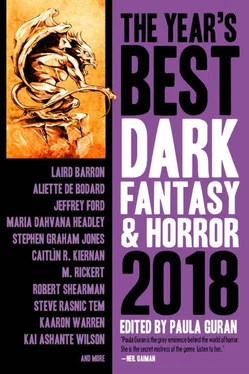“Aren’t you going to finish the rum?” she said instead, and her teeth were suddenly chattering too much; she bit her tongue.
“It’s okay, ’annah,” Robbo said, taking hold of both of her hands and pulling them into the warmth of his chest. She could feel his frantic heartbeat against her knuckles.
She thought of his mate being led out to the police car, still wet from his shower, looking back at Robbo in his skivvies and slippers. She squeezed closed her eyes. The world will be white and quiet , she thought, the world will be white and quiet, like a mantra that she’d once believed in but now no longer trusted at all.
“I’m sorry,” she whispered.
She kept hold of Robbo’s hands as she lifted up her head, as she opened her eyes. She gripped them harder as she let herself see all those bloated fists of white wind around them. All those casually cruel eyes, hungry dark mouths. The hundreds—maybe now even thousands—of them crouched inside the expectant silent hush. They weren’t waiting for her; they weren’t waiting for anything. They were simply taking their pleasure, stretching it as far as they could.
She remembered how it had felt to know that she had someone caught and trapped by her smiling lies; how the anticipation of destroying all she had built up had so often loomed larger than the final act itself. And how that need to purge—to pass along all her fear and furious loneliness, like a contagion of fire along headland and cliff—had never waned, never ever lost its power. She was sorry for it now—sorry for all of it—but she’d never lied to herself. She’d never pretended that if the Whites hadn’t come she would ever have stopped.
The world will be white and quiet.
“It’s okay, ’annah,” Robbo said again, pressing the wet prickle of his face against her own as those eyes, those mouths, all that eager, twisted white rushed over the camp in a suffocating fog that would soon not be quiet at all. “It’s okay.”
And she believed him, she trusted him, she clung onto him. Even though he was blind.
Secret Keeper
Bonnie Jo Stufflebeam
1
You know how this story goes: the girl was kissed in the womb by the devil. When she emerged into the too-bright world, she was missing half her face where his teeth tore it off. The doctors did their best; they grafted skin over the left side, added collagen in her cheeks. “Smile,” they said, tickling her feet. But she could not smile, and so no one smiled at her.
A girl is supposed to be beautiful. A girl is supposed to have rosy red cheeks and a laugh that makes men wilt to think of her bright future. A beautiful girl will have a beautiful life. An ugly girl slips unseen through secret doors.
The girl was always good at finding secrets. She was better at keeping them.
2
An ugly girl does what she can to get by. She is thrown into the world of zits and water bras and miniskirts, but none of that matters when she wears a face like flattened roadkill. When she is caught staring at the other faces in the locker rooms—eager to linger long on that which she doesn’t have—her interest is misnamed in a world obsessed with naming things. But this girl already has many names: Erica, at first, then ghost, a name given her for the ghastly pallor of her grafted skin.
A ghost girl cries for her first year of middle school, listening to an old Patti Smith song—“Pissing in a River”—and hoping someone might wrap their arms around her and carry her to a home where she is wanted, where there are hundreds of ghost girls like her. When she realizes that no one is coming, she stares into the mirror so long her face distorts into a thing of beauty. She is changed. She tears her eyes away. She must change.
She seeks out secrets like shadows seek their objects, until she finds the shadows’ secrets, until she knows how to be shadow when she needs to be.
3
The world of first cars and first fucks and first drinks is different than the awkward world of first kisses. All anyone wants is to be seen. But to be seen is to give away your power. To be hidden is to be known. Her first day of school, the ghost girl disappears, a shadow fleeing from the light. Everyone talks about her for a week, until she becomes a secret. Until she becomes so infamous, she is given credit for secrets she doesn’t spill, for wrongs she doesn’t commit. The football player’s jockey cup is filled with ketchup, and her name is signed to the note: Ghost Girl . The capital letters their own new rank. The English teacher’s book is shredded in her chair. Ghost Girl . Every tire in the parking lot is slashed. Ghost Girl.
Though that one was her. It hurts to laugh, so she moans as she watches her classmates fail to flee the school in the rain.
They say she creeps through the ceiling. They say she gets a report card, the same as anyone, and that the teachers are too scared to give her anything but A’s. They say she and the gym coach are having an affair; they meet beneath the bleachers every morning. Sometimes, late at night, they hear a voice belting a song only one girl recognizes from her parents’ record collection: “Pissing in a River.”
But the ghost girl is all alone, for one, two, three years of school. The ghost girl won’t earn a high school degree. The ghost girl doesn’t creep through the rafters. She prefers the home she has built beneath the theater stage, in the drained pool where the swim team used to practice, before the school’s swim budget was slashed. Her favorite season: the spring musical, when she falls asleep in the daylight dark to the struggling pitches of budding singers, most of whom will never sing after their high school tenure. The teacher favors the girl with the highest voice, the one who leaves your ears ringing: Aimee. The ghost girl plugs her ears when Aimee sings. Her world beneath the stage is too dark for such shrillness. The ghost girl knows the limit of her own talent. Though she could out-sing every one of these girls, she cannot stand in front of an audience, cannot let that much of her outside her body. She waits and listens, but does not hear anything that makes her shiver the way that Patti Smith record does.
Then, a new girl sings. Her name, she speaks softly into the mic, is Chrissie. When Chrissie sings, the ghost girl’s chest throbs with a particular empty ache. From the rafters, the ghost girl watches her: Chrissie with her short dark curls, her beautiful face bereft of makeup, her bright yellow smiley-face shirt and torn jeans. She is kind, the ghost girl notices, to everyone.
The ghost girl follows Chrissie to class, moving in shadows the other students don’t see. She has become good at seeing shadows, at inhabiting them. The ghost girl doesn’t slash Chrissie’s tires when she pulls the prank a second time. When Chrissie is called into the principal, blamed, the ghost girl slips an alibi into Chrissie’s files: a psychiatrist’s appointment in another city, for a condition Chrissie doesn’t like to talk about. The ghost girl has done her homework; the condition is the same one that Chrissie was treated for as a little girl. Though she was pronounced healed, the school buys the excuse.
The ghost girl tracks Chrissie’s every move.
A new girl finds it hard to make friends. A new girl eats lunch alone in a bathroom stall. It is there that the ghost girl comes to her, hiding in the walls and speaking in her ghostly secret keeper voice.
“Chrissie,” calls the ghost girl, singing her own song. She has had years with little to do but practice. “I am your angel of music.”
The ghost girl has been thorough. From Chrissie’s files, she found two facts that will make it easier to be a friend. 1. Chrissie’s mother died when Chrissie was a little girl. 2. After her death, Chrissie heard voices. These voices? Chrissie called them her angel of music. A ghost girl can be an angel of music; the name seems to fit her better than all the names she has ever clutched in her palms. The Devil, after all, was an angel fallen.
Читать дальше












